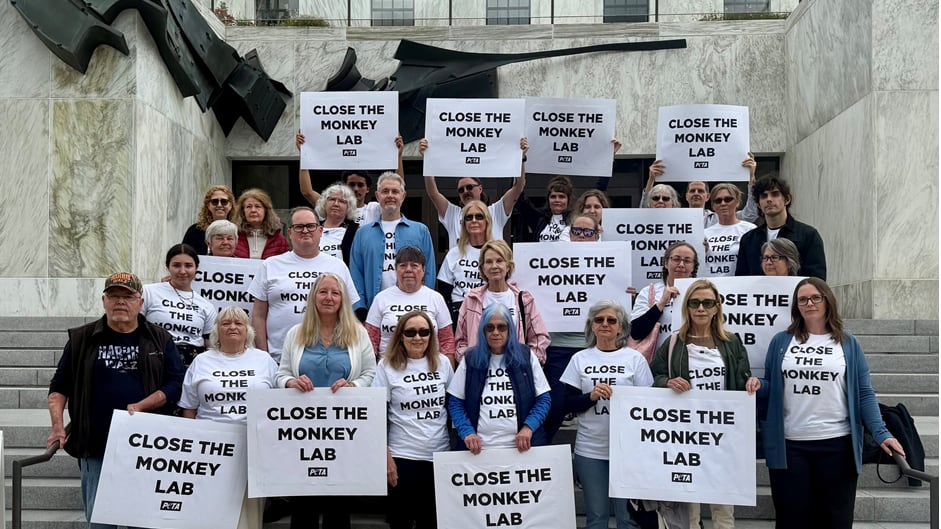Animal rights advocates crowded a committee hearing in the Oregon House of Representatives today and pressed legislators to amend a bill banning painful research on dogs and cats in order to close Oregon Health & Science University’s primate center.
More than 100 people signed up to testify in support of the bill, according to Rep. David Gomberg (D-Otis), who testified himself, asking the committee for the OHSU amendment. A total of 1,660 people submitted written testimony on the bill, most of them seeking closure of the Oregon National Primate Research Center, a 200-acre facility in Hillsboro.
Animal rights advocates and medical ethicists have turned up the heat on the primate center this year, running ads on television and radio showing grim scenes of monkeys in small cages. Earlier this year, they flooded Oregon Health Authority regulators with comments aimed at forcing OHSU to close the primate center as a condition of buying Legacy Health, a deal that died when the parties called it off last week.
Gomberg, a longtime critic of the primate center, said the facility is poised to become a liability because the Trump administration is cutting back on animal research for drug safety. Almost all of the center’s $63 million annual budget comes from the National Institutes of Health, a target of the administration’s cost cutting.
“The money is going to go away, and the primate center is going to land on the state of Oregon with a thud,” Gomberg said in an interview after the hearing.
Among the proponents of amending the bill to close the primate center was Matt Rossell, campaigns manager at the California-based Animal Legal Defense Fund who worked as a primate technician at the OHSU facility for two years.
“What I witnessed at OHSU would outrage you,” Rossell told the committee. “More than 1,000 monkeys were living alone, each in a tiny cage. For social primates, long-term isolation is torture. Videos I took show the consequences: monkeys self-mutilating, displaying stereotypical circling and pacing, compulsively rocking, self-clasping, and chronically pulling out their hair. Their plan to address the psychological well-being of the monkeys was not set up to work, but rather just ticked the box required by federal law.”
Beyond the cruelty, Dr. Lisa Jones-Engel, senior science adviser for primate experimentation at People for the Ethical Treatment of Animals, said the center should be closed because so few drugs tested in primates prove useful to humans.
“I’m here to talk about the monkey in the room,” Jones-Engel said. “More than 20,000 monkeys ago, OHSU’s PC promised us an HIV vaccine. We’re still waiting.”
Joe Baessler, executive director at the American Federation of State, County and Municipal Employees, bucked the trend in the room and argued for keeping the center open. His union represents about 170 workers and researchers at the facility.
Baessler said he testified reluctantly, and only because union members were in the crosshairs. “I feel like our folks are under attack and I need to say something,” he said.
On a personal note, Baessler said he had recently recovered from cancer.
“My cancer treatment was researched at the primate center,” Baessler said. “I’m not sure I would still be here. The folks who work there save human lives.”
OHSU says the primate center produces breakthroughs that can’t be made without experiments on close cousins to humans.
“The Oregon National Primate Research Center at Oregon Health & Science University is dedicated to the humane, respectful treatment and the best possible veterinary care for the nearly 5,000 nonhuman primates at the center,” an OHSU spokeswoman said in a statement last month. “Many of these animals are part of a breeding colony that supports NIH-funded research dedicated to improving human and animal health, including ongoing research into potential vaccines and treatments for COVID-19.”
Since 2020, OHSU says, primate center researchers have applied for 12 patents and have been awarded three. One researcher started a company, OHSU says.
Gomberg says the next step is to see if members of the House Committee on Emergency Management, General Government, and Veterans agree that there is a path forward for the measure, including an amendment calling for action on the primate center.
“We’re waiting to see what the reaction is to the testimony,” Gomberg said.

